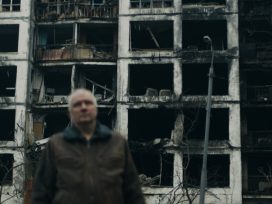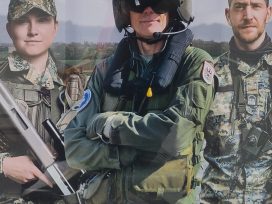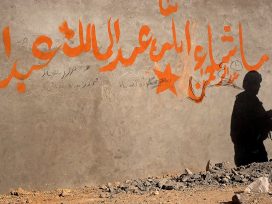Through the lens of Russian imperial identity, there is no place for dialogue and negotiation: Ukraine can only be assimilated or exterminated. Ukrainian resistance has to be seen for what it really is – a decolonial fight for democracy.
Professor of history Serhy Yekelchyk spoke with poet, translator, writer, and PEN Ukraine Honorary President Mykola Riabchuk on 16 June 2022 for PEN Ukraine’s series #DialoguesOnWar. This is an edited transcription of key moments from their discussion. You can check out the recorded conversation here.
Serhy Yekelchyk: I am currently in Canada, on an island on the Pacific coast, perhaps in the most distant location from the war in Ukraine. But it does not, of course, mean that I do not follow the recent developments. On the contrary, the Canadian perspective on the war may be in many ways more interesting and supportive than that of some European countries.
Mykola, you are in Western Europe. It is a pleasure talking to you again. What news in recent days can force us to rethink the developments in Ukraine and Russia? Any perspective that was not previously open to us?
Mykola Riabchuk: I have been staying in Paris since September, completing my year-long research fellowship. The war caught me here. I am currently involved in tons of very hectic journalistic activities. I have postponed all my academic research.
I have to explain many complicated things to Western audiences. In many cases, I encounter deep misunderstandings. But, at the same time, I see very strong interest and empathy. The situation is different from that of 2014, when, apart from the great interest, there was also great confusion. The picture was less clear. First of all, the knowledge of Ukraine was much more limited. Secondly, the developments in Ukraine were very confusing for the West because the Revolution of Dignity in Ukraine was framed by Moscow propaganda as a coup d’état. Public opinion was not so unanimously pro-Ukrainian. Now it is obvious: everyone understands that Ukraine is a victim, that it was attacked unprovoked.
How do we proceed from now on? Politicians have different opinions about this. On one hand, everyone understands that Russia is a huge and very powerful country in possession of nuclear weapons. Therefore, it is very questionable to what degree it can be defeated. At the same time, more and more people are starting to understand that this is a genocidal war and Ukrainians have no other choice but to resist. They understand that Russia cannot be rewarded. If Ukraine makes any concessions and recognises any territorial or status gains for Russia, it would encourage other rogue states to perform similar tricks.
The key element of this war is the problem of Russian imperial identity, which has largely determined all the developments. This was a trigger, a very deep source of this conflict, but it was inevitable in a way. If we analyse how Russian imperial identity was historically constructed in the eighteenth century, we see that from the very beginning there was no place for Ukraine in it.
Ukraine had to be either absorbed and assimilated or exterminated. That is basically what we are observing today. For a very rational western audience, this zero-sum game might be difficult to understand. They believe in dialogue, negotiation, and finding solutions more or less acceptable for both sides. They do not understand the desire to ‘find a final solution to the Ukrainian question’.
Serhy Yekelchyk: I agree that Russia’s undeveloped identity as a modern nation is behind so many historical problems in eastern Europe. It is sad that it takes war crimes, crimes against humanity, and genocide to wake up some western observers and statespersons to the fact that Ukraine needs support and Russia needs to be condemned.
Mykola, what do you think in your book Nationalist lexicon and other essays was particularly important for the understanding of the current stage of Russian aggression?
Mykola Riabchuk: Obviously, the title is ironic. This is not the Bible for nationalists. What I was trying to say is that we are all very different; our identities are situational and fluid; we can be both cosmopolitans and nationalists at the same time. This book is not an academic method, it is not a rational explanation, it is a reflection based on the discussion of different situations.
I also have a question for you: what can you write now, as a historian? All our attention is focused on contemporary developments, on the future. How do you project today’s situation on your past research?
Serhy Yekelchyk: For a historian of Ukraine’s twentieth century, contemporary developments under Russian occupation are very much recognisable. They resonate with the deepest structure of Ukrainian historical memory; with the persecution of Ukrainian intelligentsia during the Russian occupation of Galicia from 1914-1915; and with the Holodomor, Stalin’s state-engineered genocide of 1932-1933. The very notion of the grain being taken by the Russian army is so immediately recognisable that it sends chills up my spine, it provokes a physical reaction.
These are the powerful signals which, of course, come unnoticed by the Russian side, because their historical memory pretends that nothing of the above ever really happened: there was no genocide of Ukrainians, and Stalin was a great historical figure who is ranked very high in Russian opinion polls.
For many decades, I would have answered the question about the object of my research by saying that my early work was on the Ukrainophiles, Ukrainian patriots in the Russian Empire who tried to undermine it in a cautious way, limited by the draconian legislation. My subsequent books were on Stalinism, the time when people could claim in a very cautious ethnographic way that they were Ukrainian because they wore an embroidered shirt, danced, or sang, but nothing beyond that: the moment they became political, they would end up in a gulag.
But the cultural and political dimensions of identity are different, and this is something that Putin is discovering right now. Cities that are overwhelmingly Russian-speaking still produce mass protests against the Russian occupation. The Russian failure to take Kharkiv is another indication of the fact that Ukrainian cities fight back because the notion of Ukraine is that of a democratic political community that can be chosen and is increasingly being chosen by people who are not necessarily ethnic Ukrainians.
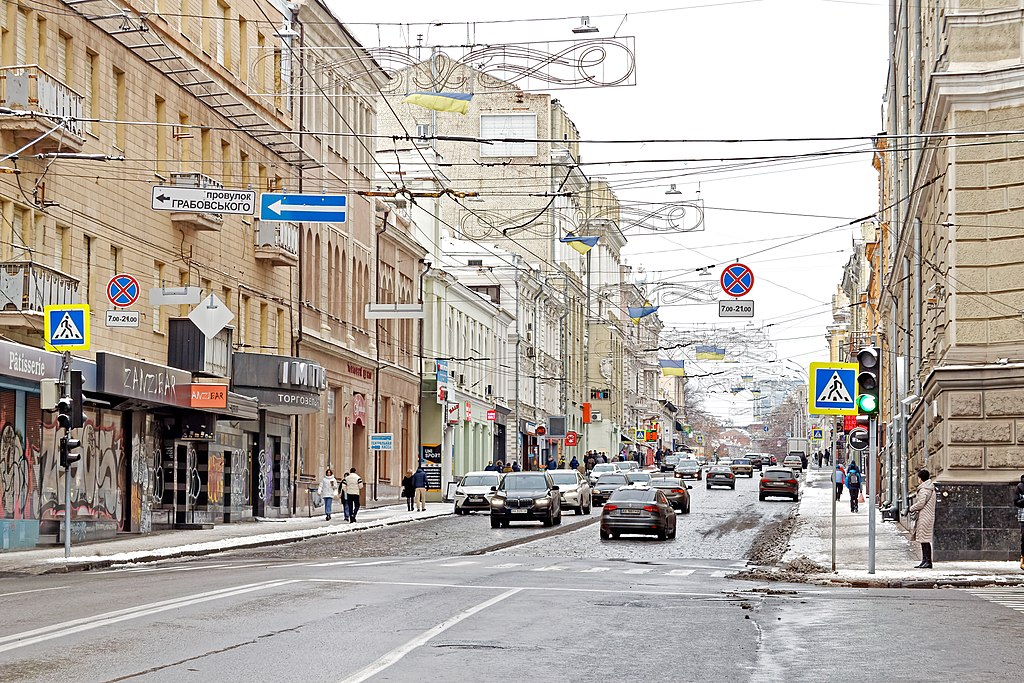
Sumska Street in Kharkiv, November 2020. Image via Wikimedia Commons.
Moving forward, my research is going to be on that precisely: on how Ukrainian identity becomes the democratic choice, the pro-European choice, and why Europe needs to support it. We still see the obsession with Russia in some parts of Europe, but I think the West is well on its way to learning the lessons of history – perhaps several hundred years too late for Ukraine.
How are you reflecting on the issues connected to Ukrainian identity during Russia’s war against Ukraine?
Mykola Riabchuk: You mentioned this so-called Western obsession with Russia, which is a real phenomenon, but I believe it’s secondary to our discussion. The essence is Russian imperial knowledge: since the eighteenth century it has been produced, disseminated, powerfully institutionalised, exported, and established in the West as academic, objective, scientific knowledge, which remained unquestioned until recently. This is where the western obsession with Russia comes from. Of course, there are also powerful economic interests and business lobbies, but without this imperial knowledge, without the perception of Russia as the only agent in the region, they would not have the free hand they are having now.
I want to deconstruct this imperial knowledge. It is high time to challenge it. Until the collapse of the Soviet Union, it was very problematic. The very idea of the Soviet Union being an empire was unacceptable back then. After the collapse, this narrative started to permeate western academia. However, we still have problems with mass media, common wisdom, and popular culture.
Imperial knowledge is a huge problem because it marginalises other countries. The Russian Empire, the Soviet Union, and any empire try to speak on behalf of the subjugated peoples. They have no voice, they are invisible, marginalised, provincialised, they lose agency, they are nobody. Of course, it is difficult to come out of this shadow. This is what we are doing now. We paid a high price for Ukrainian reemergence, regrettably belated. Nobody can deny Ukrainian agency, nobody can question its nationhood anymore.
This deconstruction is a duty of all academics, not only historians or political scholars. We have to decolonise the knowledge about Russia, the Soviet Union, and Eastern Europe, all these very complicated but essentially colonial relations. This war is decolonial, it is a national liberation war. In 1991, we regained our independence relatively easily. The empire, however, was weakened, but not defeated. It accepted the loss of colonies but has not reconciled with this loss. What is happening now is the second, and hopefully final part of our national liberation struggle.
I believe this explanation is very important for the so-called Global South. The way Ukrainian developments are covered in the mass media of Latin American, African countries, and India, for example, is indeed very sad. In most cases, the war is presented as a proxy war between the US and Russia. Ukraine has no agency whatsoever. Ukrainians are pawns manipulated by Americans who want to weaken Russia. There is a refusal to understand that Ukrainians are fighting a decolonial war, exactly like these countries did in the past. Fighting the stereotypes that persist in the Global South is a huge challenge.
Serhy Yekelchyk: Exactly. I have also been thinking about the new tools available to us now that the term decolonisation received wide recognition in the West. In particular, it makes it easier to explain the developments in Ukraine in the nineteenth and especially the early twentieth century. I am sure you have noticed that some figures from that transitional period, like Lesia Ukrainka, have become much better understood in the Ukrainian canon than before.
That transition from speaking Russian to speaking Ukrainian as a matter of principle was the moment of complete – not partial, like in the case of Drahomanov’s generation – rejection of the empire. Mykhailo Drahomanov was the first one to introduce the West to the notion of ethnographic Ukraine, but his goodbye to the empire was not final. It took Lesia Ukrainka’s generation to make that ultimate break.
And then, of course, there is an immediate parallel with your generation, Mykola. I think back to my years as an undergraduate student at the Taras Shevchenko National University of Kyiv. In the late 1980s, I was reading your articles and thinking: ‘Wow, this is new.’ New in a dangerous, challenging, and exciting way. It was then that I switched to speaking Ukrainian.
I cannot help but think of the generations that went through the same transformation: Russian speakers living in Ukraine in the 1920s who chose Ukrainian identity. Ethnic Germans who became prominent Ukrainian poets. Jewish writers who made what Yohanan Petrovsky-Shtern called an anti-imperial choice. It looks like we are reliving a moment which has already happened in Ukrainian history.
It looks like history keeps repeating itself, and we should probably derive some lessons from it, so that we do not end up having to repeat the same cycle. This time, however, it seems that the West is finally waking up, and we have important tools to help it. For example, by showing that the removal of colonial statues is essentially the same thing Ukrainians started doing several years earlier. And it’s easy to understand why: Lenin in Ukraine does not stand for Communism, but for the Russian colonial past, for closeness to Russia. In the West, once you label a coloniser as such, there is no going back. Do you feel the West is opening up to our argumentation?
Mykola Riabchuk: Yes, I believe that this overwhelming western support for Ukraine is not only determined by the fact that this is an unprovoked war in Europe. It is also the only war of such a scale carried out by a dictatorship against democracy. Ukraine is a democracy, maybe not very mature but quite functional, while Russia is an increasingly totalitarian state with mandatory ideology and persecutions.
Right now, there is a trade-off between interests and values in the West. This issue has to be discussed. We have to find arguments to finally persuade western societies that some sacrifices are necessary for both strategic and moral reasons.
Serhy Yekelchyk: To add up to that from the Canadian perspective, I have to say that Canada is a unique western country because of the presence of the largest Ukrainian-Canadian community – not numerically, but proportionally. This is why the government and all three major political parties here are fully supportive of Ukraine.
However, the Canadian military is not very robust. That is a limitation that I find myself explaining to Ukrainian colleagues quite often. The second most important government position is occupied by a Ukrainian woman, Chrystia Freeland, from the Chomiak family of Edmonton. Canada is a wealthy country compared to Ukraine. But just like other Western countries, apart from the US, it does not have a strong-standing army or many weapons to send to Ukraine.
The West needs to understand that we live in a new world, one in which democracy is being challenged by dictatorial, authoritarian regimes. And this is not just Russia. Others are waiting in the wings to see how the situation will unfold. This is a valuable lesson for western governments. They need to change their entire worldview. Recent signals from Germany and France about building a more powerful European army and messages from the UK and the US about creating an alliance with Ukraine, Poland, and the Baltic states indicate that there is no agreement on how this situation is going to unfold from now on.
Right now, Ukraine plays a very important historical role in forcing the West to wake up, to unite against a very real threat. The Ukrainian tragedy is that we have to go through genocide, through Russian invasion to show the West that the Cold War is not over.
#DialoguesOnWar is a series of conversations between leading thinkers hosted by PEN Ukraine.
Published 11 August 2022
Original in English
First published by Eurozine (as transcript)
Contributed by PEN Ukraine © Serhy Yekelchyk / Mykola Riabchuk / PEN Ukraine / Eurozine
PDF/PRINTIn collaboration with
In focal points
Newsletter
Subscribe to know what’s worth thinking about.
Related Articles

For those who suffered the consequences of Yalta’s division of Europe, the Helsinki Final Act brought grounds for optimism. Today, as Russia’s regressive war on Ukraine reopens old conflicts, it stands as a monument to European modernity.
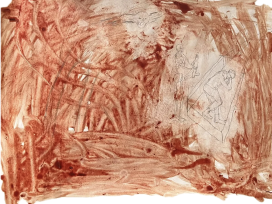
Artist Marharyta Polovinko’s creativity persisted in a tormented form through her experiences as a soldier on the Ukrainian frontline. The words of a recently called-up fellow creative and young family man provide a stark reminder that the Ukrainian military is buying Europeans time.

